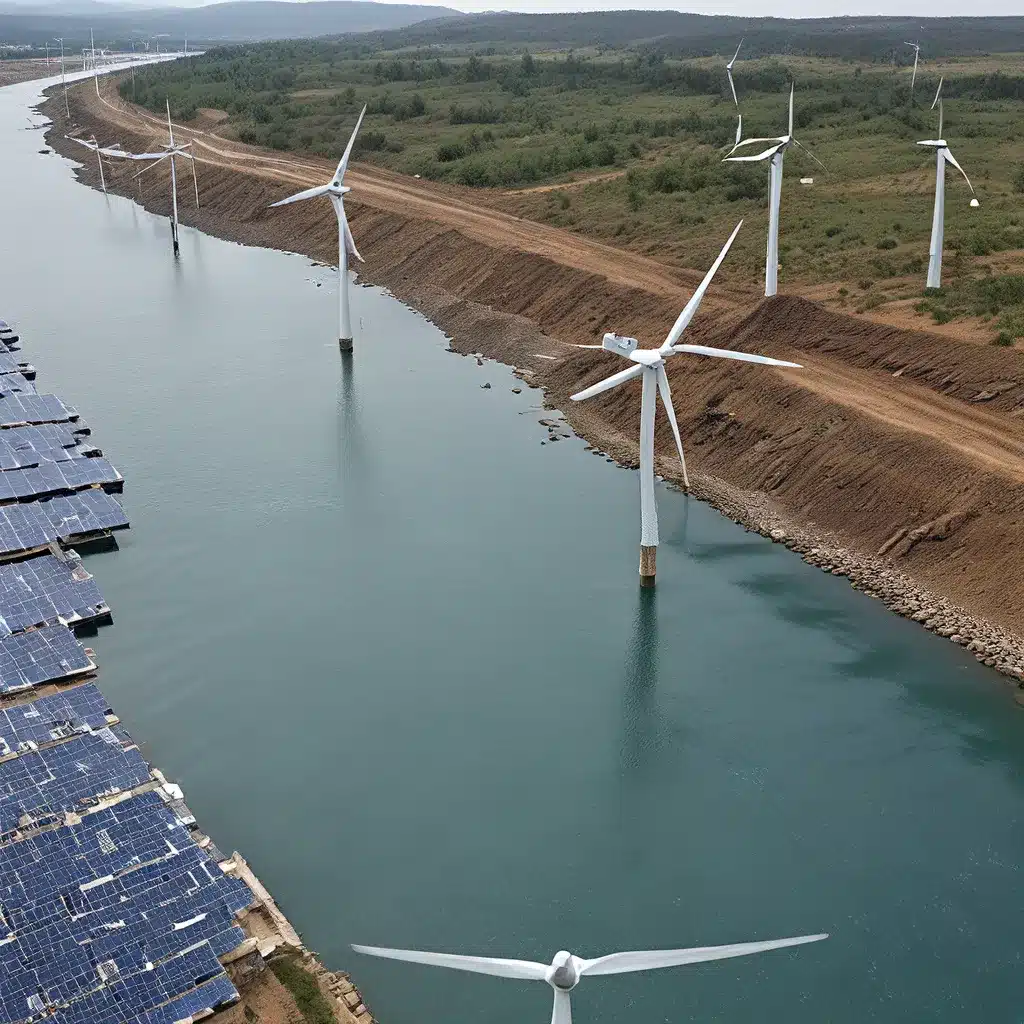
Exploring the Intricate Relationship Between Water and Renewable Energy
As the world grapples with the urgent need to transition towards sustainable energy solutions, the water-energy nexus has emerged as a critical area of focus. This intricate relationship between water and renewable energy holds the key to unlocking a more resilient and environmentally responsible future.
I’ve always been fascinated by the complex interplay between these two essential resources. It’s like a delicate dance, where each step forward in renewable energy development requires a thoughtful consideration of water availability and usage. And let me tell you, it’s a dance that’s only getting more intricate as we navigate the challenges of climate change.
Recent research has shed light on the multifaceted nature of this water-energy nexus. We’re talking about the water required for renewable energy production, the energy needed for water treatment and distribution, and the potential trade-offs and synergies that arise when we try to optimize both systems.
It’s a lot to wrap our heads around, I know. But bear with me, because I’m about to take you on a journey that’ll have you rethinking the way we approach renewable energy solutions. We’ll explore the policy perspectives, the technological innovations, and the collaborative efforts that are shaping this critical intersection.
Renewable Energy’s Thirst for Water
Let’s start by addressing the elephant in the room: the fact that renewable energy systems often have a significant water footprint. Take a technology like concentrated solar power (CSP), for example. These large-scale solar installations rely on water for cooling and steam generation, which can put a strain on local water resources, especially in arid regions.
But it’s not just CSP. Hydropower, another cornerstone of renewable energy, is deeply intertwined with water availability. Fluctuations in rainfall and drought can directly impact the power generation capacity of hydroelectric dams, leading to potential supply disruptions.
And let’s not forget about biofuels, where the water required for crop cultivation and processing can be staggering. Some studies have shown that the water footprint of biofuel production can be significantly higher than that of traditional fossil fuels.
It’s a complex web of interdependencies, and policy makers are increasingly recognizing the need to address these water-energy tradeoffs head-on. Integrated resource planning and cross-sectoral collaboration are emerging as key strategies to strike a balance and ensure the sustainability of both water and renewable energy systems.
The Energy Demands of Water Infrastructure
But the water-energy nexus doesn’t stop there. The energy required for water treatment, pumping, and distribution is another critical factor to consider. Desalination plants, for instance, are energy-intensive operations that can put a strain on the local power grid, particularly in regions where renewable energy sources are still nascent.
Researchers estimate that the energy consumption of water infrastructure can account for up to 40% of a municipality’s total energy budget. That’s a significant chunk, and it highlights the need for innovative solutions that can marry renewable energy with water management systems.
But the opportunities here are vast. Imagine hydropower plants that double as water storage facilities, or solar-powered desalination units that can provide clean water to remote communities. These are the kinds of integrated solutions that are starting to emerge, and they hold the promise of a more sustainable and resilient future.
Navigating the Policy Landscape
As you can probably tell, the water-energy nexus is a complex and multifaceted challenge that requires a holistic approach. Policy makers have a crucial role to play in shaping the regulatory landscape and incentivizing the right kind of solutions.
Some countries have already made significant strides in this direction. Israel, for example, has invested heavily in desalination technology powered by renewable energy, helping to alleviate water scarcity and reduce the overall energy footprint of its water infrastructure.
Other nations are exploring integrated resource planning frameworks that coordinate water and energy policies, ensuring that investments in one sector don’t inadvertently undermine the other.
But there’s still a long way to go. Regulatory barriers, financing gaps, and lack of cross-sectoral collaboration continue to hamper progress in many parts of the world. It’s a challenge that will require innovative policy approaches, public-private partnerships, and a genuine commitment to sustainability from all stakeholders.
Embracing the Future of the Water-Energy Nexus
As I look to the future, I’m filled with a sense of cautious optimism. The water-energy nexus is a complex and multifaceted challenge, but it’s also a tremendous opportunity for us to rethink the way we approach sustainable development.
Technological breakthroughs, collaborative efforts, and forward-thinking policies are paving the way for a future where renewable energy and water management coexist in harmony. It’s a future where energy-efficient desalination provides clean water to those in need, where hydropower plants serve as water storage hubs, and where biofuel production is carefully balanced with water conservation.
Of course, there will be setbacks and uncertainties along the way. The effects of climate change will continue to complicate the picture, and trade-offs will need to be carefully navigated. But I’m confident that by working together, by embracing innovation, and by prioritizing sustainability, we can unlock the full potential of the water-energy nexus.
So, my friends, let’s embark on this journey with a spirit of curiosity and a willingness to adapt as we navigate the evolving landscape. The future of our planet and our communities depends on it.

